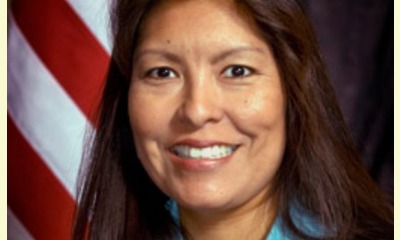|
|
First Native American Woman Becomes Federal Judge
un article par Kevin Mathews, Care2
The United States will finally have its first Native American woman
serve as a federal judge. Though she has not
received her official post yet, Judge Diane
Humetewa, a member of the Hopi tribe, received a
unanimous confirmation vote of 96 to 0 from the
Senate.

Judge Diane Humetewa
click on photo to enlarge
The significance of the appointment was enough to
garner bipartisan support. Humetewa’s reputation
for being a fair and knowledgeable judge has also
helped to earn her fans on both sides of the
aisle. President Barack Obama’s appointment had
the overwhelming approval of both of Arizona’s
Republican senators, John McCain and Jeff Flake.
Both senators expressed their excitement to see
the revered judge serve their state and country at
a higher level.
Previously, Humetewa had the distinction of being
the first Native American woman appointed as a
U.S. Attorney by a president. Between 2007 to
2009, she prosecuted cases that pertained to the
Native American community, including violence and
archaeological resources.
In addition to her role with the federal
government, Humetewa has also served as both a
prosecutor and a judge for the Hopi tribe. Outside
of that role, she has successfully advocated to
give Native Americans access to higher education,
specifically by building a relationship with
Arizona State University.
Decades ago, Jimmy Carter was the first president to
appoint a Native American man, Judge Frank Howell
Seay, to serve as a federal judge. In recent years,
however, no judge of Native American descent – man
or woman — has held this title.
“As the only Native American in active service on
the federal bench, Diane provides much-needed
expertise on the complexities of federal law and
Indian sovereignty,” said Senator Jon Tester, a
Montana Democrat who chairs the Senate Committee
on Indian Affairs.
Native Americans have largely praised Humetewa’s
appointment and confirmation, hoping it is a trend
that will continue. “There is still a massive lack
of representation of Indian judges in the federal
courts,” said Chris Stearns, a Najavo who worked
for the House Natural Resources Committee.
The National Congress of American Indians added,
“[We] greatly appreciate the efforts of the
president and the Senate in achieving this
historic confirmation. There are many qualified,
talented people like Diane Humetewa in Indian
country who are able and willing to serve. We
eagerly anticipate many more nominations of Native
people to the federal bench and other offices.”
(Thank you to Janet Hudgins, the CPNN reporter for
this article.)
|








|
DISCUSSION
Question(s) liée(s) à cet article:
The understanding of indigenous peoples, Can it help us cultivate a culture of peace?
* * * * *
Commentaire le plus récent:
Two articles in recent years in CPNN point to the renewed recognition of the importance of indigenous knowledge and traditions to help save us from the ecological disaster of the global industrialized economy.
In the article preparing for the upcoming People's Summit in Rio (See CPNN April 12, 2012), Fabiola Ortiz emphasizes the importance of involving indigenous peoples in the decision-making about development projects.
The indigenous peoples of the Amazon made this argument very dramatically and eloquently in person at the World Social Forum in Belem, Brazil, as described the CPNN article of February 6, 2009.

|
|









